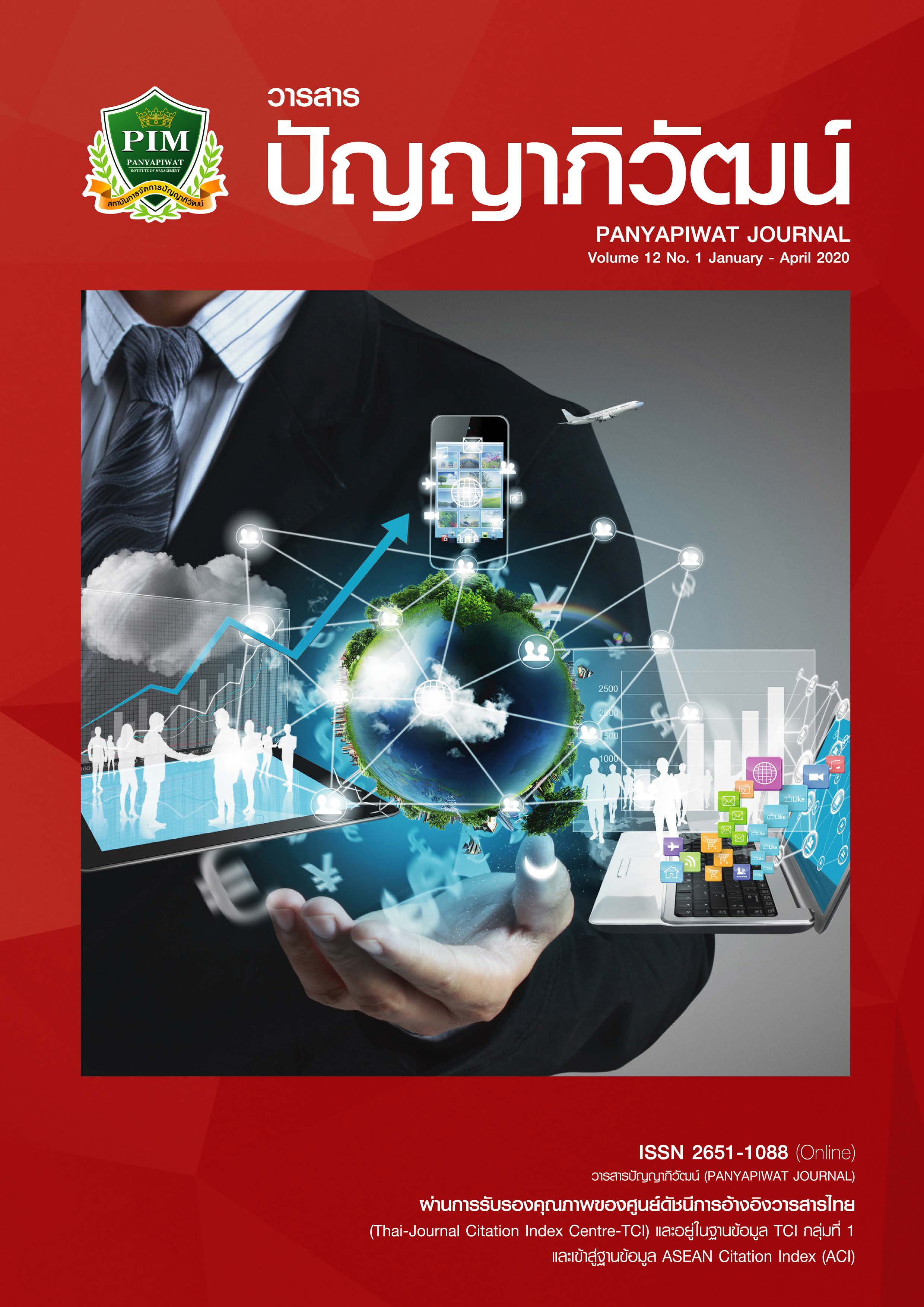กระบวนทัศน์ รูปแบบ และกลไก การพัฒนาครูตามแนวคิดเครือข่ายเชิงพื้นที่: กรณีศึกษาพื้นที่กรุงเทพมหานครและปริมณฑล
Main Article Content
บทคัดย่อ
การวิจัยครั้งนี้เป็นการวิธีวิจัยแบบผสมผสาน (Mixed Method) มีวัตถุประสงค์ คือ 1) เพื่อศึกษาสภาพปัจจุบันและสภาพพึงประสงค์ของการพัฒนาครูตามแนวคิดเครือข่ายเชิงพื้นที่: กรณีศึกษาพื้นที่กรุงเทพมหานคร และปริมณฑล 2) เพื่อพัฒนากระบวนทัศน์ รูปแบบ และกลไกการพัฒนาครูตามแนวคิดเครือข่ายเชิงพื้นที่ ผู้ให้ข้อมูล แบ่งออกเป็น 3 กลุ่ม คือ กลุ่มที่ 1 สถาบันผลิตครู จำนวน 49 คน กลุ่มที่ 2 สถานศึกษา จำนวน 249 คน กลุ่มที่ 3 ผู้ทรงคุณวุฒิ และผู้มีส่วนได้ส่วนเสีย จำนวน 17 คน เครื่องมือที่ใช้ในการวิจัยประกอบไปด้วยแบบสอบถาม จำนวน 5 ฉบับ คือ 1) แบบเก็บรวบรวมข้อมูลสถาบันผลิตครู 2) แบบเก็บรวบรวมข้อมูลสถานศึกษา 3) แบบสอบถามสถาบันผลิตครู 4) แบบสอบถามสถานศึกษา และ 5) แบบประเมินความเหมาะสมและ ความเป็นไปได้ของร่างกระบวนทัศน์ รูปแบบและกลไกการพัฒนาครูตามแนวคิดเครือข่ายเชิงพื้นที่กรุงเทพมหานครและปริมณฑล สถิติที่ใช้ในการวิเคราะห์ข้อมูล ได้แก่ ความถี่ ร้อยละ ค่าเฉลี่ยส่วนเบี่ยงเบนมาตรฐาน การวิเคราะห์เนื้อหา (Content Analysis) และค่าความต้องการจำเป็น (PNImodified)
ผลการวิจัยพบว่า สภาพปัจจุบันของกระบวนทัศน์การพัฒนาครูเป็นกระบวนทัศน์แบบดั้งเดิม ในขณะที่สภาพที่พึงประสงค์คือ กระบวนทัศน์แบบใหม่ สภาพปัจจุบันของรูปแบบการพัฒนาครูเป็นแบบการพัฒนาครู นอกเวลาการปฏิบัติงานโดยไม่ผ่านระบบออนไลน์ ในขณะที่สภาพที่พึงประสงค์คือ รูปแบบการพัฒนาครู ในระหว่างการปฏิบัติงานโดยไม่ผ่านระบบออนไลน์ สภาพปัจจุบันของกลไกการพัฒนาครูเป็นกลไกหน่วยงาน (Organization Mechanism) ส่วนสภาพพึงประสงค์คือ กลไกเครือข่าย (Network Mechanism) สำหรับกระบวนทัศน์การพัฒนาครูตามแนวคิดเครือข่ายเชิงพื้นที่คือ กระบวนทัศน์การพัฒนาสมรรถนะและคุณภาพจากภายในของครูเพื่อผลลัพธ์ผู้เรียนตามความต้องการของภาคอุตสาหกรรมและชุมชน รูปแบบการพัฒนาครูคือ รูปแบบผสมผสานออฟไลน์ ออนไลน์ มุ่งปฏิบัติ และวิจัยร่วม และกลไกการพัฒนาครู ได้แก่ กลไกเครือข่าย เบญจภาคีของสถานศึกษา สถาบันผลิตครู ภาคเอกชน ชุมชนท้องถิ่น และต้นสังกัดของสถานศึกษาระดับจังหวัด
Article Details
“ข้าพเจ้าและผู้เขียนร่วม (ถ้ามี) ขอรับรองว่า บทความที่เสนอมานี้ยังไม่เคยได้รับการตีพิมพ์และไม่ได้อยู่ระหว่างกระบวนการพิจารณาลงตีพิมพ์ในวารสารหรือแหล่งเผยแพร่อื่นใด ข้าพเจ้าและผู้เขียนร่วมยอมรับหลักเกณฑ์การพิจารณาต้นฉบับ ทั้งยินยอมให้กองบรรณาธิการมีสิทธิ์พิจารณาและตรวจแก้ต้นฉบับได้ตามที่เห็นสมควร พร้อมนี้ขอมอบลิขสิทธิ์บทความที่ได้รับการตีพิมพ์ให้แก่สถาบันการจัดการปัญญาภิวัฒน์หากมีการฟ้องร้องเรื่องการละเมิดลิขสิทธิ์เกี่ยวกับภาพ กราฟ ข้อความส่วนใดส่วนหนึ่งและ/หรือข้อคิดเห็นที่ปรากฏในบทความข้าพเจ้าและผู้เขียนร่วมยินยอมรับผิดชอบแต่เพียงฝ่ายเดียว”
เอกสารอ้างอิง
Bulloch, R. V. (1997). International Handbook of Teachers and Teaching (Springer International Handbooks of Education). Dordrecht, Nederland: Springer.
Butcher, J., Howard, P., Labone, E., Bailey, M., Groundwater Smith, S., McFADDEN, M. A. R. K. & Martinez, K. (2003). Teacher Education, Community Service Learning and Student Efficacy for Community Engagement. Asia-Pacific Journal of Teacher Education, 31(2), 109-124.
Cavanagh, D. (1983). Teacher Development: Curricular Problems and Paradigm Possibilities. Australian Journal of Teacher Education, 8(2), 7.
Chu, S., Fong, N. S. N. & Tang, S. Y. (2010). Applying Outcomes-based Teaching and Learning Framework in the BSc Information Management Program in the Faculty of Education. The 2010 International Conference on Enhancing Learning Experiences in Higher Education (pp. 1-18). Hong Kong: The University of Hong Kong.
Creswell, J. W. (2013). Research Design: Qualitative, Quantitative, and Mixed Methods Approaches (2nd ed.). Thousand Oaks, CA: Sage Publications.
Darling-Hammond, L. (1994). Professional Development Schools: Schools for Developing a profession. New York: Teachers College Press.
Davidson, M., JENSEN, B., Klieme, E., Vieluf, S. & Baler, D. (2009). Creating Effective Teaching and Learning Environments: First Results from TALIS. Paris: OCDE
Down, B., Hogan, C. & Madigan, R. (1995). School-based Teacher Education: The Lived Experience of Students, Teachers and University Staff. In Summers, L. (Ed), A Focus on Learning. The 4th Annual Teaching Learning Forum (pp. 62-66). Perth: Edith Cowan University.
Dyson, A., Kerr, K. & Raffo, C. (2012). Area-based Initiatives in England: Do They Have a future? Revue française de pédagogie. Recherches en éducation, (178), 27-38.
Fielding, A. J., Cavanagh, D. M. & Widdowson, R. E. (1978). Diploma in Education? Rethinking the Curriculum. Australian Journal of Teacher Education, 3(2), 1.
Fielding, T. (1983a). Personal Construct Theory as a Basis for a Non-Deterministic Model of Teacher Development. Australian Journal of Teacher Education, 8(2), 2.
Fielding, T. (1983b). The Theme of Teacher Development. Australian Journal of Teacher Education, 8(2), 1.
Furlong, J., Whitey, G., Whiting, C., Miles, S., Barton, L. & E. Barret. (1996). Redefying Partnership: Revolution or Reform in Initial Teacher Education? Journal of Education for teaching, 22(1), 39-55.
Jennings, C. & Wargnier, J. (2011). Effective Learning with 70: 20: 10. The New Frontier for the Extended Enterprise. Retrieved Aug 9, 2018, from https://www.crossknowledge.net/ crossknowledge/whitepapers/ effective-learning-with 70 20 10-whitepaper.pdf
Lawson, M. J. & Askell-Williams, H. (2007). Outcomes-based Education. Association of Independent Schools of South Australia (AISSA): Australia.
Lu, M., Loyalka, P., Shi, Y., Chang, F., Liu, C. & Rozelle, S. (2017). The Impact of Teacher Professional Development Programs on Student Achievement in Rural China: evidence from Shaanxi Province. Journal of Development Effectiveness, 11(2), 105-131.
Mack, O., Khare, A., Krämer, A. & Burgartz, T. (Eds.). (2015). Managing in a VUCA World. Cham, Switzerland: Springer.
Malan, S. P. T. (2000). The New Paradigm of Outcomes-based Education in Perspective. Journal of Consumer Sciences, 28(1), 22-28.
McNamara, D. (1983). Less Idealism and More Realism: The Programme for Teacher Education. Australian Journal of Teacher Education, 8(2), 5.
Metzler, J. & Woessmann, L. (2012). The Impact of Teacher Subject Knowledge on Student Achievement: Evidence from Within-Teacher Within-Student Variation. Journal of Development Economics, 99(2), 486-496.
Narintarangkul-Na-Ayudhaya, S. (2018). Paradigm, Model and Mechanism for Area-Based Teacher Development. Educational Management and Innovation Journal, 1(3), 82-100. [in Thai]
Office of the Education Council. (2015). Status of Teacher Production and Development in Thailand. Bangkok: Prik Wan Graphic. [in Thai]
Office of the National Economic and Social Development Council. (2016). The Twelfth National Economic and Social Development Plan (2017-2021). Bangkok: Office of the Prime Minister. [in Thai]
Sanderson, D. R. (2016). Working Together to Strengthen the School Community: The Restructuring of a University-School Partnership. School Community Journal, 26(1), 183-198.
Sheehan, B. A. & Lewis, R. (1983). Some Implications of a Non-Deterministic Model of Teacher Development. Australian Journal of Teacher Education, 8(2), 8.
Siribanpitak, P., Xupravati, P., Usaho, C., Chamchoy, S. & Narintarangkul-Na-Ayudhaya, S. (2018). The Development of Teacher Education and Teacher Development System Drive Mechanism for High Performance Teacher under Thailand 4.0. Bangkok: Prik Wan Graphic. [in Thai]
Snoek, M. & Wielenga, D. (2001). Teacher Education in the Netherlands Change of gear. Retrieved July 15, 2018, from https://www.efa.nl/publicaties/unesco-cepes/fulltext.doc
Spady, W. G. (1994). Outcome-Based Education: Critical Issues and Answers. American Association of School. Arlington, U.S.: Administrators.
Timperley, H., Wilson, A., Barrar, H. & Fung, I. (2007). Teacher Professional Learning and Development: Best Evidence Synthesis Iteration Wellington. Wellington, New Zealand: the Ministry of Education.
Trent, J. & Lim, J. (2010). Teacher Identity Construction in School–University Partnerships: Discourse and Practice. Teaching and Teacher Education, 26(8), 1609-1618.
Tsui, A. B. & Law, D. Y. (2007). Learning as Boundary-Crossing in School–University Partnership. Teaching and teacher education, 23(8), 1289-1301.


